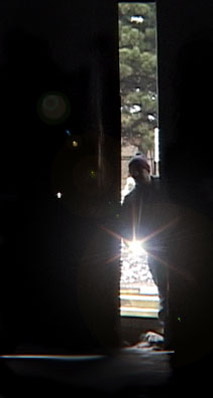| Reviews & Columns |
|
Reviews DVD TV on DVD Blu-ray 4K UHD International DVDs In Theaters Reviews by Studio Video Games Features Collector Series DVDs Easter Egg Database Interviews DVD Talk Radio Feature Articles Columns Anime Talk DVD Savant Horror DVDs The M.O.D. Squad Art House HD Talk Silent DVD
|
DVD Talk Forum |
|
|
| Resources |
|
DVD Price Search Customer Service #'s RCE Info Links |
|
Columns
|
|
|
Echoes of Forgotten Places
Echoes of Forgotten Places is an interesting visual arts disc from Canada and the brainchild of Robert Fantinatto and Leesa Beales, Toronto based industrial filmmakers. The 43-minute video explores the cavernous interiors of what the filmmakers call Industrial Archeological Sites -- the long-abandoned factories and warehouse complexes left to rot when industry moves on. Most of the film is composed of arresting video images taped in the vast decaying interior spaces of huge factories. Fantinatto's camera lingers on cavernous steel mills and power plants that look as if they haven't been entered in twenty or thirty years. Original flyers and paperwork litter the offices and banks of equipment sit as if waiting to be reactivated.
For the "explorers" who make it their business to trespass on these premises, the factory complexes are undiscovered countries for investigation. Much of the video plays with only the music of Robin Guthrie and Leesa Beales on the soundtrack, but Beales narrates part of each chapter with philosophical musings about the "Aesthetics of Decay," and several unidentified speakers add more comment in interviews glimpsed on a B&W monitor positioned at one of the sites.

The film fulfills only part of our curiosity. The speakers tell us of their awe and respect for these spaces and what the represent. Looking at the giant work areas, the locker rooms and the washing basins built to service hundreds, we think of the armies of highlyskilled workers that once were the pride of our nation. How many rows of machine tools lined the shop floor? One power plant contains lines of enormous turbine generators that cover an area larger than a couple of football fields. Each individual unit is a massive iron structure; the scene looks as if it came out of H.G. Wells' Things to Come. The young voices remind us that human societies tend to ignore, destroy and bury their own history until it's so forgotten that archeological scientists are needed to rediscover how we once lived. They lament the neglect visited on these sites, knowing they will soon be cleared away for new development.
Actually, what we seem to hear most is these explorers' regret for the loss of their private playgrounds. We all know the feeling of having 'special places' as kids and resenting it when they disappear. We 1950s and 60s kids had plenty of access to interesting areas on private and public property -- storm basins and canals, undeveloped fields, construction sites, old mission-era buildings -- to explore and call our own. And it hurts to go back to these same places and see nothing but wall-to-wall apartments and industrial parks. No wonder modern kids are sullen and rebellious -- we had much a greater attachment to our environment.
The more interesting story in Echoes of Forgotten Places is the untold one. The Urban Explorers edge around the term "trespassing" but admit that these are potentially dangerous areas. They talk about their code of conduct: No vandalizing, no thievery and no altering of the environment. They move slowly and carefully, treading carefully on rotten flooring and broken ladders as they scale structures six and seven stories tall. We even see them exploring forbidding, treacherous-looking tunnels.
The obvious next thought is that the story of the adventurers is not told because it might encourage more interlopers with less aesthetic motives. Some of the spaces we see are already tagged with graffiti. And some hazards may be invisible -- a few of the explorers wear particle masks. That mist in the air may be bad mold, or quite possibly carcinogenic asbestos powder.
What we remember from Echoes are the odd details -- pools of water and mud on the floors of giant factories where the weather has broken in, and snowdrifts and walls of icicles decorating another steel workspace in winter. Echoes of Forgotten Places is first and foremost a thought-piece for a crumbling, rusting past.
Scribble Media's DVD of Echoes of Forgotten Places is an acceptably mastered video piece shot on high-grade video and edited to maintain a leisurely pace that encourages reflection. The audio job is equally clear. At 43 minutes it gets the job done without wearing out its welcome.
Galleries of still photos number 125 images and are organized by photographer's names. A twenty-minute industrial film from 1936 shows the process of steel production (three processes, actually) in full detail. It's from the Prelinger collection and after a splicey opening is in reasonable shape. A telling moment shows us a long line of automobiles parked outside an enormous steel mill. The narrator proudly boasts that only in America are workers treated so well that they can afford luxuries like cars. That promise of American industry -- a national enterprise that benefited all -- got turned around after the 1960s, didn't it?
On a scale of Excellent, Good, Fair, and Poor, Echoes of Forgotten Places rates:
Movie: Very Good
Video: Very Good
Sound: Very Good
Supplements: Steel: A Symphony of Industry (1936 industrial film), Image Gallery
Packaging: Keep case
Reviewed: April 28, 2006
| |
|
| Popular Reviews |
| Sponsored Links |
|
|
| Sponsored Links |
|
|
| Release List | Reviews | Shop | Newsletter | Forum | DVD Giveaways | Blu-Ray | Advertise |
|
Copyright 2024 DVDTalk.com All Rights Reserved. Legal Info, Privacy Policy, Terms of Use,
Manage Preferences,
Your Privacy Choices | |||||||












